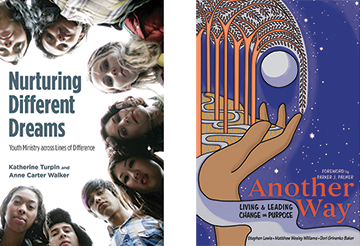
ÔÇťNurturing Different Dreams: Youth Ministry across Lines of DifferenceÔÇŁ
co-written by Dr. Anne Carter Walker, dean of academic programs and executive director of the Saint Paul School of Theology at ├█╠ĎË░¤˝AV (with Katherine Turpin)
Increasingly, adolescents and young adults in the United States are racially and socioeconomically diverse, while the teaching population remains predominantly white and middle class. Youth and college ministries that are historically white struggle to provide adequate support, mentoring, and cultural understanding for students from marginalized communities.
As educators from privileged backgrounds, the writers draw from their experiences in an intentionally culturally diverse youth ministry. Through engaging case studies and vignettes, they re-examine the assumptions about youth agency, vocational development, educational practice, and mentoring.
Offering concrete guidelines and practices for working effectively across lines of difference, ÔÇťNurturing Different DreamsÔÇŁ invites readers to consider their own cultural assumptions and practices for mentoring adolescents, and assists readers in analyzing and transforming their practices of mentoring young people who come from different communities than their own.
Recommended: ÔÇťI have been reading ÔÇśAnother Way: Living and Leading Change on Purpose,ÔÇÖ by Stephen Lewis, Matthew Wesley Williams, and Dori Baker. The authors help me to name just how often leadership is shaped by practices that I would describe as colonial. They propose ÔÇśanother wayÔÇÖ that values community, seeks discernment, slows us down, and helps us to critically reflect on how our decisions might impact those on the margins. The practices for leadership described by the writers as CARE (Creating Hospitable Space, Asking Self-Awakening Questions, Reflecting Theologically Together, and Enacting the Next Most Faithful Step), prompt me to pay attention to the driving forces behind my decision-making, to consider deeply all those who my decisions might affect, and to trust both myself and the process to generate good, true, nurturing change.ÔÇŁ
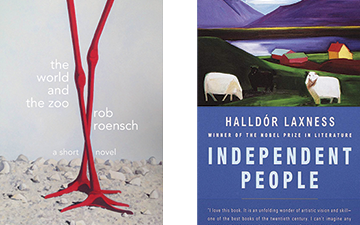
ÔÇťThe World and the ZooÔÇŁ
by English professor Rob Roensch
When a recent grad takes a summer zoo internship, itÔÇÖs supposed to be a rebel detour before adulthood. But over the summer, the zoo and its humans deliver much more. A story of awakening exploring love, death, biology, and privilege, rich with the genius of squirrels, the grace of otters, the gorillasÔÇÖ need for quiet, and the bovine dreams of whitetail deer. Funny, meditative, and deeply human, ÔÇťThe World and the ZooÔÇŁ is a masterful short novel, carving a delicate path full of breathtaking details.
Roensch wrote that he unexpectedly found himself writing about zoos and realized: ÔÇťWe want to experience the authentic presence of nature. ÔÇŽ (But) the human desire to know and treasure the world is always frustrated. ÔÇŽ We are always looking for something.ÔÇŁ
Recommended: ÔÇťThe best book I read this summer was ÔÇśIndependent PeopleÔÇÖ by Nobel Prize-winner Halldor Laxness. ItÔÇÖs an epic novel about life in early 20th century rural Iceland. ItÔÇÖs funny, very beautiful, and very sad, and thereÔÇÖs lots of sheep in it.ÔÇŁ
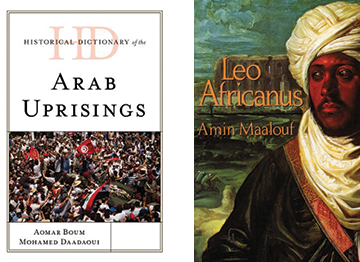
ÔÇťHistorical Dictionary of the Arab UprisingsÔÇŁ
co-written by political science professor and Chair Dr. Mohamed Daadaoui (with Aomar Boum)
The Arab uprisings that swept the Middle East and North Africa in the period from 2011ÔÇô2012 left an indelible mark on the socio-political landscape of the region. But that mark was not consistent across the region: While some countries underwent dramatic popular social and political changes, others teetered on the brink or were left with the status quo intact. Street revolutions toppled despotic regimes in Tunisia, Libya, and momentarily in Egypt, while mounting serious challenges to authoritarian regimes in Syria and Yemen. AlgeriaÔÇÖs entrenched bureaucratic-cum-military authoritarian system proved resilient until the recent events of early 2019 which forced the resignation of President Abdelaziz Bouteflika before the end of his term on April 28, 2019. As in Algeria, protesters in Sudan succeeded, after months of demonstrations, in overthrowing the government of Omar al-Bashir. Several Arab monarchies still appear stable and have managed to weather the tempest of the Arab revolutions, albeit not without fissures showing in the edifice of their states, accompanied by some minor constitutional changes. Where Tunisians, Egyptians, Yemenis, Syrians, and Libyans demanded regime changes in their political systems, protesters in the Arab monarchies have called on the kings and emirs to reform their political system from the top down, indicating the sizable monarchical advantage.
ÔÇťHistorical Dictionary of the Arab UprisingsÔÇŁ contains a chronology, an introduction, and an extensive bibliography. The dictionary section has over 500 cross-referenced entries on the terms, persons, and events that shaped the Arab Spring uprisings.
Recommended: ÔÇťI am reading ÔÇśLeo AfricanusÔÇÖ by Amin Maalouf, a memoir of the eponymous Renaissance era traveler and diplomat. The novel is a fascinating narrative of that era from Leo AfricanusÔÇÖ perspective in which he details the fall of Muslim Andalusia, the Moorish exile to Fez, and later travels to Cairo and Rome. I like the rich description of the traditions and customs of the time, and the geopolitical analysis that Leo offers of the main political protagonists like King Ferdinand of Spain, Sultans Selim I and Suleiman the Magnificent of the Ottoman Empire, and Popes Leo X, Adrian VI, and Clement VII. It is an important time in the history of Europe and the Middle East that the novel weaves in the story of Leo Africanus.ÔÇŁ
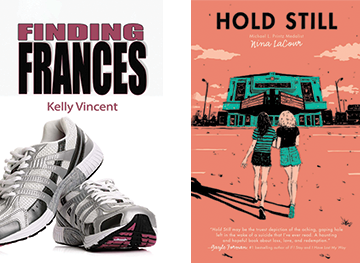
ÔÇťFinding FrancesÔÇŁ
by Kelly Vincent, Red Earth MFA creative writing student
This novel for teens takes an authentic look at the far-reaching impact domestic violence has on its victims, with an average 15-year-old girl embarking on a journey that helps her find strength she never knew she had. Retta Brooks thinks her life is on track after convincing her overprotective mom to stop home-schooling her and allow her to go to Buckley High. She comes home from a night out with friends to find that her whole world has changed, and now she has to figure out who she is, who she can trust, and why her mom lied.
Recommended: ÔÇťI recently read ÔÇśHold StillÔÇÖ by Nina LaCour, a heartbreaking but ultimately uplifting novel about a teen girlÔÇÖs recovery from her best friendÔÇÖs suicide. I love the emotional depth of LaCourÔÇÖs books, and this is probably her best.ÔÇŁ
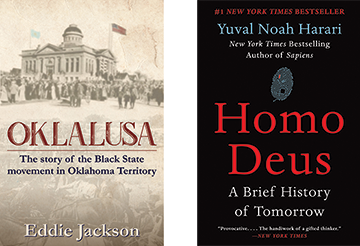
ÔÇťOKLALUSA: The Story of the Black State Movement in Oklahoma TerritoryÔÇŁ
by Eddie Jackson (BA ÔÇÖ65, JD ÔÇÖ96)
From the reddest of the red states comes the untold but true story of men and women with fleecy locks and dark complexions who seek to make Oklahoma Territory a black state. They begin with the black Indians in Indian Territory and reach out to the industrious classes of the five million ex-slaves ensconced in the South. White people are sharply divided among those who fear and those who support the idea. The action is furious, and the issues reach deep into the White House, where a man called the ÔÇťBright Jewel of the Negro raceÔÇŁ vies to be appointed governor by President Harrison. Oklalusa explains the reasons for the 28 all-black towns and lays the groundwork for Black Wall Street. Here is insight into some of the origins of the race problems that plague the country still.
Recommended: ÔÇťCurrently reading ÔÇśHomo Deus: A Brief History of TomorrowÔÇÖ by Yuval Noah Harari, which challenges medical, religious, and economic dogma. It provides creditable inspiration for new thought about maintaining youth and reaching for immortality.ÔÇŁ
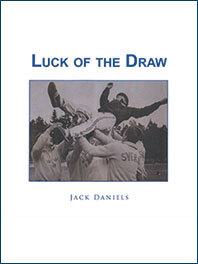
ÔÇťLuck of the DrawÔÇŁ
by Jack Daniels, former exercise physiology professor and ├█╠ĎË░¤˝AVÔÇÖs first track and cross country coach
DanielsÔÇÖ autobiography ranges from his studies and athletics to his roles as husband and father. As he considered his life, he realized luck had led him along his path, including to South Korea with the U.S. Army. There, he learned about the sport of modern pentathalon, which includes cross country horseback riding over 25 obstacles, fencing, pistol shooting, swimming, and running. Daniels went on to win two Olympic medials, a World Championship, and two U.S. National Championships in the sport.
He has worked as an Olympic Games commentator in Canada and a national track coach in Peru, conducted research with Nike, and coached Olympic athletes.
